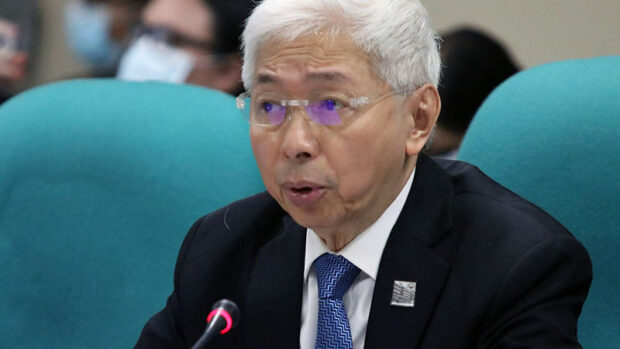PH, EU to restart trade pact talks next month

Department of Trade and Industry (DTI) Secretary Alfredo Pascual (Senate Public Relations and Information )
MANILA, Philippines — After about six years in limbo, the European Union (EU) and the Philippines have officially agreed to resume negotiations for a free trade agreement (FTA) that promises to take their long-standing bilateral partnership to another level through strengthened economic ties, increased trade and greater cooperation.
Trade Secretary Alfredo Pascual on Tuesday said initial discussions on the trade pact should begin in September, with formal negotiations projected to begin as early as next year.
“We expect that these discussions will start with a scoping exercise. And our expectation is that we can commence this right after the usual summer holidays in Europe. Maybe in early September,” Pascual said at a press briefing in Makati City.
The EU said in a statement that the scoping process with the Philippine government would “assess to which extent they (EU and Philippines) share a mutual understanding on the future FTA.”
Pascual said the government hoped to finish the requisite scoping exercise before the end of the year, meaning that the formal discussions could then start by 2024.
Bilateral FTAs are meant to encourage economic trade between countries through the reduction or removal of tariffs and quotas for export and import goods, and the expansion of access to each other’s market.
Negotiations for the FTA between the Philippines and the EU officially began back in 2015. Two sessions of negotiations were held in 2016 and 2017 before going into an extended hiatus.
But with the formal agreement to finally restart talks as announced by European Commission (EC) President Ursula von der Leyen and EU Ambassador Luc Veron, an FTA is back on the agenda.
‘Huge potential’
Veron said in a social media post that the FTA would “boost trade and foster greater cooperation” between the two countries.
Von der Leyen added that the partners were taking their bilateral partnership “to the next level,” starting with the relaunching of the negotiations.
“It has huge potential for both of us in terms of jobs and growth and it can help to de-risk and diversify our trade,” von der Leyen said.
Pascual said technical experts from both sides would discuss a wide range of topics, including market access for goods and services, investment liberalization, trade and sustainable development, government procurement, and dispute settlement.
“Our mutual objective is to officially resume the Philippine-EU FTA negotiations at the most reasonable time, bolstering our economic cooperation for the benefit of our people,” he added.
Exploring the FTA opened after von der Leyen’s two-day visit to Manila beginning Monday, when she met with President Marcos to discuss deepening bilateral relations.
Consideration of the country’s FTA came after their negotiations with Thailand also resumed with the goal of further engaging with the Indo-Pacific region.
Von der Leyen described the Philippines as a “key partner for us in the Indo-Pacific region” and said launching the scoping process elevates the ties.
“Together, we will realize the full potential of our relationship, creating new opportunities for our companies and consumers while also supporting the green transition and fostering a just economy,” she said.
Trading partner
The EU, through its FTA, aims for ambitious market access commitments, swift and effective sanitary and phyto-sanitary procedures, as well as the protection of intellectual property rights, including geographical indications.
It will also be anchored on the principle of “sustainable development” by supporting high levels of “protection for workers’ rights, for the environment, and the achievement of ambitious climate goals.”
According to the EC, the EU is the Philippines’ fourth largest trading partner by regional bloc, with trade in goods between the two totaling 18.4 billion euros or P1.11 trillion in 2022.
The EU, according to the EC, is also one of the largest investors in the Philippines, with the regional bloc’s foreign direct investments in the Philippines reaching 13.7 billion euros or P824.4 billion in 2021.
The Philippines is also currently a beneficiary in the regional bloc’s preferential trading scheme for developing countries, the EU GSP Plus, under which import duties for over 6,000 Philippine goods are rated zero until the end of 2023.
These export goods include crude coconut oil, as well prepared or preserved tuna and pineapple.
Vacuum cleaners, spectacle lenses, new pneumatic tires of rubber, relays for voltage, bicycles and other cycles, footwear, and industrial fatty alcohol are also included in this export list.
Should the FTA be implemented, a local trade association of garment exporters on Tuesday said they expected an exponential increase in export revenues along with the creation of around 200,000 new jobs in the industry.
“Easily, I think we are doing about $200 million [worth of exports annually] for the European market. So, easily I think we can move forward to $600 million in the first two years [of negotiation],” said Maritess Jocson-Agoncillo, executive director of the Confederation of Wearable Exporters of the Philippines.
She added that in the first or second year of the actual implementation of the FTA, revenues from garment exports to the regional bloc could be bolstered to as much as $800 million to $1 billion annually.
Jocson-Agoncillo said that current import duties for the Philippines’ garment exports to the EU range from 8 percent to 12 percent, noting that bringing it down to zero under the FTA would greatly benefit the local industry.
